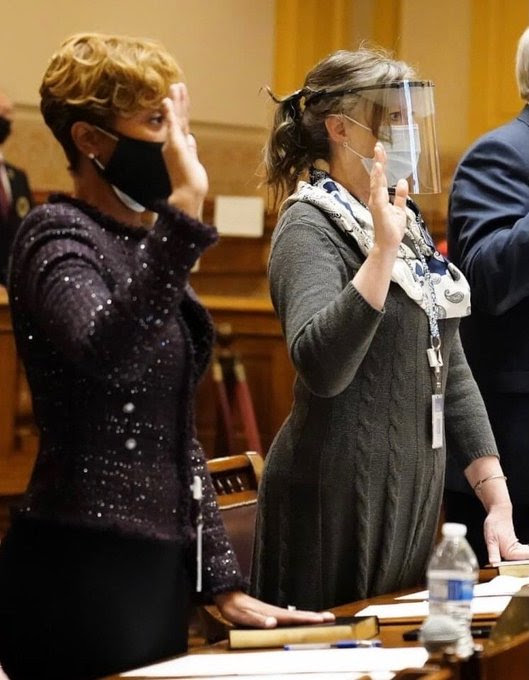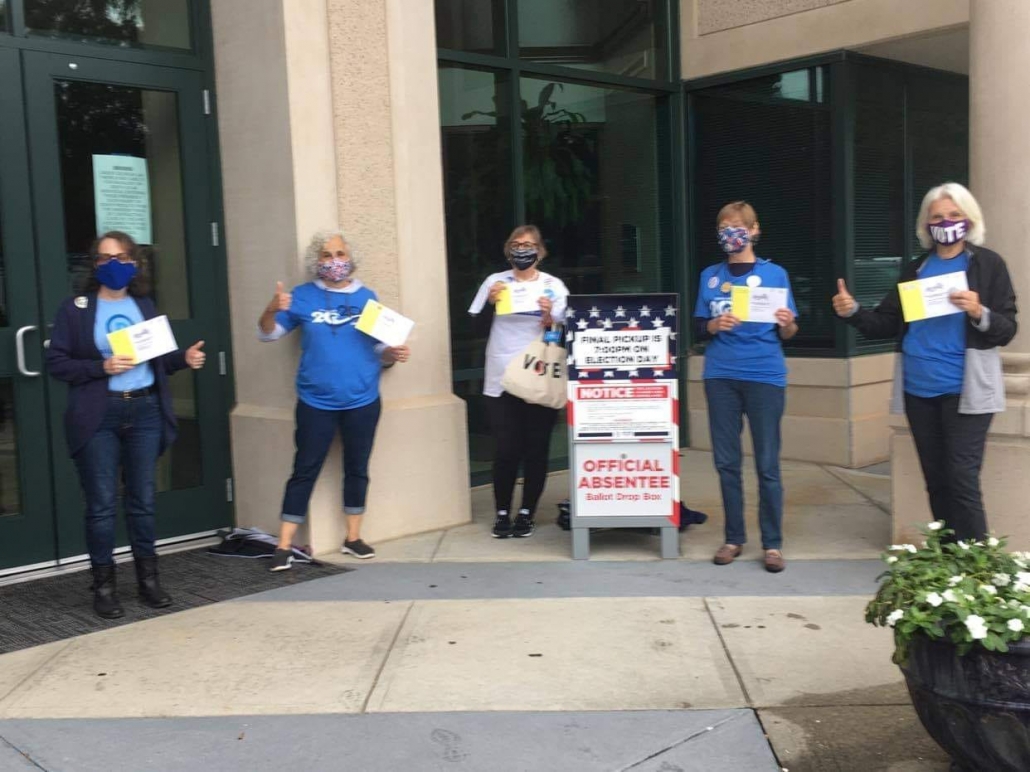Sally’s Senate Snapshot #3
The Sun Will Come Out
 As the week started off rainy and cold, it reminded me that this time last year, both of my kids were starting new schools on college campuses in cold, rainy January weather. I told them to hang in there because soon spring would come when they could enjoy their campuses more. The same can be said for these rainy days for our state and country. There will be better days ahead!
As the week started off rainy and cold, it reminded me that this time last year, both of my kids were starting new schools on college campuses in cold, rainy January weather. I told them to hang in there because soon spring would come when they could enjoy their campuses more. The same can be said for these rainy days for our state and country. There will be better days ahead!
Brighter Days Ahead for Vaccines
Slow vaccine rollouts, difficulty obtaining appointments, and the threat of new virus variants are tempering the elation we all felt with the good news of effective vaccines last December. But it’s important to remember that it’s only been 6 weeks since the first vaccine was administered in Georgia. Already, almost all long term care residents have been vaccinated (where 40%+ of the deaths occur), most healthcare workers, plus the age 65 and up Georgians who have been lucky enough to get an appointment. If you’re a math person, you’ve already calculated how long it will take to vaccinate the rest of us and the numbers aren’t good — but I believe the pace will speed up.
Increased Supply: The Biden administration announced that states will soon receive a 16% increase in the amount of vaccines and Governor Kemp announced that CVS and Walgreens have almost finished their contracts with nursing homes which will free up an additional 40,000 vaccines per week. The maddening web of systems to find a vaccine should also improve when Georgia’s centralized vaccine system goes online in a couple of weeks.
Georgia Dept. of Public Health: If you qualify for stage 1A+, you can go to any public health site in Georgia to get a vaccine and you may have better luck if you are willing and able to drive outside of metro Atlanta. You can find a full list of sites on the Georgia Department of Public Health website at https://dph.georgia.gov/locations/covid-vaccination-site
Grocery Stores: You can also periodically check Ingles, Publix and Kroger. Walmart will participate as well, but right now most Walmart vaccination sites are outside the Atlanta area.
Private Providers: Be sure to ask your doctor to see if they have vaccines, or if they will get them soon. Some small pharmacies may be administering the vaccine and may have a waitlist. Follow your county health department on social media. Some like Dekalb may announce when they have new appointments available.
Text Notifications: The text notification system I announced last week has a new number, 844-554-4024. Text VAX to this number, or visit https://discodroid.ai/vaxapp/, and the system will alert you when appointments open up in the following counties: DeKalb, Fulton, Clayton, Gwinnett, Rockdale and Newton. Unfortunately, all of these systems require computer access and literacy, which leaves too many of our citizens behind, especially the elderly. We need to find better ways to make vaccines accessible to everyone.
Weathering the Pandemic at the Capitol
 Masks and twice-weekly testing continue to be the norm at the Capitol. I was happy to see House Speaker Ralston, who expelled one of his members for failing to get tested, taking things very seriously. Since session began, six Senators have tested positive, two of whom are in the hospital. Testing has helped to limit viral spread, but I was shocked to discover that no formal contact tracing is being done, after learning through the grapevine the entire Gwinnett Senate Delegation was exposed to a colleague that tested positive last week. After speaking with Minority Leader Gloria Butler, I hope that will be remedied soon.
Masks and twice-weekly testing continue to be the norm at the Capitol. I was happy to see House Speaker Ralston, who expelled one of his members for failing to get tested, taking things very seriously. Since session began, six Senators have tested positive, two of whom are in the hospital. Testing has helped to limit viral spread, but I was shocked to discover that no formal contact tracing is being done, after learning through the grapevine the entire Gwinnett Senate Delegation was exposed to a colleague that tested positive last week. After speaking with Minority Leader Gloria Butler, I hope that will be remedied soon.
So much of our work relies on conversations between colleagues, which is tough when you’re wearing masks and wanting to keep interactions as brief as possible. Many meetings are done via Zoom, including the Women’s Legislative Caucus, which I co-chair again this year with Representative Kim Alexander. We held our first Zoom meeting this week and heard from the Georgia Budget and Policy Institute about how the pandemic has affected working women.
The “Small” Budget Moves with Lightning Speed
The “small” budget that adjusts current fiscal year spending flew through the House and into the Senate to get it done as soon as possible in case the pandemic worsens and we have to cut session short. After back to back appropriations subcommittee meetings, the House passed the budget on Thursday and immediately transmitted it to the Senate so that the Senate could start our subcommittee process bright and early at 6:30 am the next morning.
Despite being in the midst of a global pandemic and state revenues being up 4%, Governor Kemp’s recommended budget included only a 2.5% increase, opting instead to rely primarily on federal funds and preserve the state’s $2.7 billion “rainy day” fund while it pours down rain on hard working Georgians. The House added funds to cover several new senior level public health positions, replace our state’s outdated vaccination tracking system, boost funding to nursing homes and a program that provides HIV/AIDs medication to low income Georgians, and purchase 500 new school buses to replace a third of the state’s aging fleet.
There were no new funds for the Georgia Department of Labor, even though the Georgia Budget and Policy Institute estimates that there are nearly 10 times the number of Georgians in our unemployment system than this time last year. In an unplanned coincidence, two of my colleagues and I took to the Senate well (video) on Wednesday to speak about how we are frustrated and failing hard working families that can’t get their unemployment benefits. Speaking from the well, especially en masse, helps to amplify issues, especially for those of us that don’t serve on the appropriations subcommittees. I will continue to push these issues to help as much as I can.
Bringing Sunshine to Issues
The Senate Democratic Caucus began rolling out our legislative agenda that focuses on our priorities of expanding voting access and helping our struggling working families. Here are some bills to watch:
- SB 26: Requires dropboxes at all early voting locations
- SB 35: Allows poll workers to be from any county to address poll worker shortages
- SB 36: Establishes a pilot program for voting awareness grants, particularly in rural areas
- SB 37: Joins the National Popular Vote Interstate Compact, an agreement among a number of states to award all of our electoral votes to the presidential candidate that wins the national popular vote
- SB 38: Allows people to request to permanently opt in to vote by mail
- SB 39: Restores voting rights for people with drug offenses
- SB 40: Allows counties to start counting absentee ballots before Election Day
- SB 24: Raises the Georgia state minimum wage from $5.50 to $15
- SB 25: Provides childcare tax credits to Georgia families
Democratic Caucus Whip Senator Harold Jones asked me, along with Senator Tonya Anderson, to be Assistant Whips, which means that we will help ensure our party stays unified on key votes.
In the coming week, I’ll begin rolling out my own legislative agenda that focuses on issues I know are important to you: expanding access to affordable health care, eliminating barriers to voting, saving our environment, tackling gun safety, making higher education more affordable, and improving our educational environment.
The Local Forecast
Our county delegations heard from a member of Congress and our county commissioners this week. It’s so important that all levels of government are connected so that we can serve you as effectively as possible. I was elected Vice Chair of the Dekalb Senate Delegation and I look forward to working closely with Dekalb Caucus Chair, Senator Emmanuel Jones. Cityhood is a major topic of discussion in Dekalb as we have active cityhood initiatives in both Central and South Dekalb. We now have the opportunity to look at cityhood thoughtfully and holistically, and to think through how these initiatives impact the entire county.
The Gwinnett Senate Delegation met with newly-elected Congresswoman Carolyn Bordeaux of the 7th Congressional district. Her district office is now up and running and she would very much like to hear from her constituents about what you need from our federal government. Her district director is Arthur Tripp and you can reach his office at 770-232-3005.
Storm Clouds Ahead: Redistricting
The ACLU presented to the Democratic Caucus on redistricting this week, a topic that is increasingly top of mind and anxiety-provoking for all of our elected officials. The legislature is responsible for redrawing district lines every 10 years just after the Census to make sure our districts account for population shifts. This means that all of our districts will look different the next time we run for re-election. We already know that Census data is running late this year due to the pandemic and other factors, so we believe that the Governor won’t be able to call the special redistricting session until mid to late fall.
In the meantime, I encourage you to learn about redistricting, demand an open and transparent redistricting process, and keep a close eye on the redistricting session to ensure that the General Assembly draws districts that allow voters to choose their representatives and not the other way around. As you often hear me say, redistricting will require us all to use our voices and to Be Loud!

 As I arrived at the Capitol Monday morning for the start of the 156th Georgia General Assembly, I felt a little like Nemo trying to find his way through the sea anemone. I admit I was scared. It’s not the first time I felt scared at the Capitol, so I told myself I knew I could push through it — like the time in the early 2000s when in order to get to my office I had to push a baby stroller through a swarm of angry men waving 1956 Confederate flags.
As I arrived at the Capitol Monday morning for the start of the 156th Georgia General Assembly, I felt a little like Nemo trying to find his way through the sea anemone. I admit I was scared. It’s not the first time I felt scared at the Capitol, so I told myself I knew I could push through it — like the time in the early 2000s when in order to get to my office I had to push a baby stroller through a swarm of angry men waving 1956 Confederate flags.
 COVID Testing: My first trip back to the Capitol since June began the week before session, as I went for my first COVID test. Many years ago I learned from Speaker Tom Murphy that the legislative desks in the chamber used to all have spittoons so legislators could spit their tobacco. Now legislators are spitting into plastic specimen cups!
COVID Testing: My first trip back to the Capitol since June began the week before session, as I went for my first COVID test. Many years ago I learned from Speaker Tom Murphy that the legislative desks in the chamber used to all have spittoons so legislators could spit their tobacco. Now legislators are spitting into plastic specimen cups!






 Photos by John Boydston. Follow him on Instagram – @johnboydstonphoto
Photos by John Boydston. Follow him on Instagram – @johnboydstonphoto
 Elimination of the HealthCare.gov Enrollment Portal: First, the Governor’s waiver will ban Georgians from using the HealthCare.gov website to shop for ACA health coverage plans. Instead of one-stop shopping on the federal portal, Georgians will be required to visit the websites of numerous private brokers to compare various ACA plans. This means these brokers may offer additional non-ACA compliant plans to unsuspecting purchasers. Kemp called HealthCare.gov “simply awful,” but failed to point out that the Trump administration has been
Elimination of the HealthCare.gov Enrollment Portal: First, the Governor’s waiver will ban Georgians from using the HealthCare.gov website to shop for ACA health coverage plans. Instead of one-stop shopping on the federal portal, Georgians will be required to visit the websites of numerous private brokers to compare various ACA plans. This means these brokers may offer additional non-ACA compliant plans to unsuspecting purchasers. Kemp called HealthCare.gov “simply awful,” but failed to point out that the Trump administration has been 